What is the #payup movement
Image: Remake
You may have come across the #PayUp movement while scrolling through your social media profiles but what is it about and who needs to #PayUp? We explain the hashtag and why you’re voice can be a powerful one for change.
If you have been on social media anytime after the COVID-19 emergency started, you likely came across the #payup movement. But what was it about precisely, and where are we now? Like many viral online movements, crucial information was distributed to a wider audience to raise awareness. The #payup campaign revealed one of the most upsetting dynamics in the fashion system.
How The Pandemic Exposed A Corrupt System
When the pandemic hit Europe and the US, shops closed up during lockdown. As a result of the anti pandemic measures, according to the Clean Clothes Campaign, “brands and retailers responded as they usually do: by pushing the risk down the supply chain”. They did this by “cancelling all orders placed before the crisis – some of which were already ready to be shipped.” Brands like ASOS and Kohl’s have cancelled product orders from their Asian suppliers and refused to pay for the in-process goods to save their bottom lines. This has forced garment factories to shutter, leaving the employees, many of whom are women with dependents, without pay or work for the foreseeable future. These workers often have no governmental social protection and are paid by the day or piece. They usually work informally without contracts, and at rates below living standards. In short, because of the callousness of fast fashion brands many garment workers and their families are now destitute.
This action has had catastrophic consequences for the factories as they front the costs for fabric and labour for the orders placed with them. They were left abandoned by brands and retailers and unable to pay their workers or their debts. However throughout this time, it was business as usual for the aforementioned brands. It was not uncommon to spot promotions, sales and special offers designed specifically to more excess stock. One brand even shelled out to shareholders too, whilst avoiding their supply chain commitments.
Social Media For Social Justice
It’s not unlikely to surmise that since the pandemic began, we’re collectively spending more time online as a way to educate ourselves about social injustice. For many it was the first time they became aware that employees at fashion brands were risking their health to produce our cheap fast fashion. There have been so many testimonies that it’s tricky to give a proper timeline of what’s behind the #payup movement. They unravel deeply rooted and complex dynamics of power and economic opportunism that have likely existed for decades. The good thing is that workers have been bravely naming names and calling brands out for their poor behaviour. So as conscious buyers, it’s crucial to use this knowledge not only to understand what to buy but what not to buy.
According to Remake, COVID-19 impacted the production in clothing factories all over the world during March and April 2020. The majority of brands involved left millions of garment producers unpaid for the work they already committed to and completed. Without having access to any savings, sanitary assistance or compensation, workers also had to face uncertainty over how to satisfy food and housing necessities. As one worker shared with Remake, “if coronavirus won’t kill my workers, hunger will.”
Remaking The World
Remake started the #Payup campaign on the 30th of March 2020, with a petition that named around 50 offending fashion brands. They asked for appropriate payment to be made for all the orders that were cancelled or paused due to the pandemic. The #PayUp movement brings together numerous labour rights groups and individual activists. Among the groups pressuring brands to #PayUp are Remake, the Clean Clothes Campaign, Labour Behind the Label, the International Labor Rights Forum, the United Students Against Sweatshops, and Extinction Rebellion. Furthermore, the collective is asking brands to pay the workers without any reduction on the agreed price, and to pay them promptly. And thanks to the international exposure of the campaign, that’s what’s happening.
Which Brands Are Involved?
#PayUp has seen many victories already and seen the promise of 18 brands reverse their stance on cancelled or paused orders. It has given access to $1 billion to workers in Bangladesh out of a total of $15 billion pledged globally. However this only represents a third of the salaries due to the unpaid workers. There is still more work to do, and more brands to hold accountable.
* Correct as of 26th August 20
Even after widespread, international condemnation of their behaviour, brands like Topshop, Primark, Balmain and Urban Outfitters are still refusing to pay their factories. Kendall and Kylie Jenner’s namesake fashion label, which until recently was listed under brands owned by Global Brands Group, has refused to take responsibility, claiming they are no longer associated with GBG. GBG is one company which has refused to pay. Kendall and Kylie are currently threatening Remake with legal action after the group drew attention to the shady relationship. Some brands are even still investing in their shareholders. Kohl’s, as an example, cancelled millions of dollars worth of existing orders from Bangladeshi and Korean garment factories just weeks before paying out $109m (£85m) in dividends to shareholders.
What Can I Do To Help?
Now we get to the big question. The answer is – a lot! If you work in the industry and know of brands or buyers cancelling or pausing orders, let Remake know. If you don’t work in fashion, do not despair. Your voice as a consumer is a powerful one and brands listen when customers complain. Sign the Change.org petition and share it on social media and with friends. You can also send a message directly to the brands involved. If you are in a position to then you can donate money too. Many of these organisations are not run to make a profit so they need help to mobilise and make things happen for the vulnerable people they help. Lets not forget that a big part of the change has been possible thanks to online activism on social media: a simple tag on your profile can go a long way! Share a post from one of the organisations with your friends and followers. Or comment on offending brand’s feeds demanding they #PayUp. Help to spread the message so more people can be made aware.
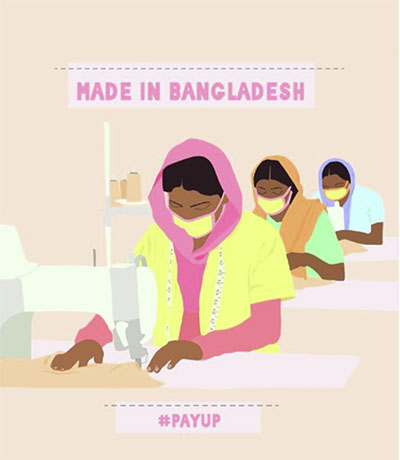
Image: Lonely Boy Designs
Did This Put A Smile On Your Face? Why Not Subscribe?
If you enjoyed this then theres plenty more on our email newsletters that you'll love. Whether you're a sustainable newbie or an eco conscious pro, our bi monthly emails will inspire you to live sustainably and ethically.

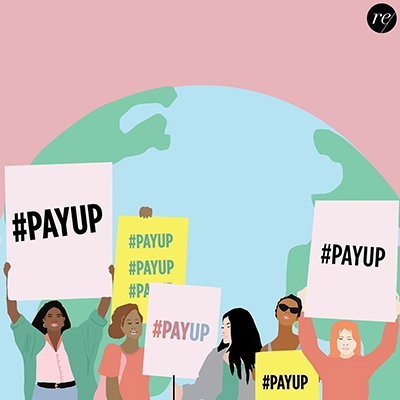
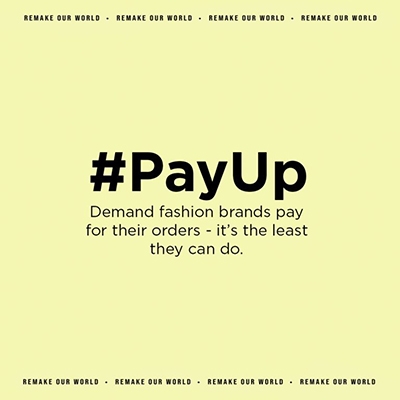
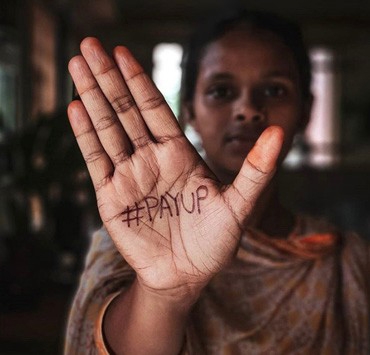
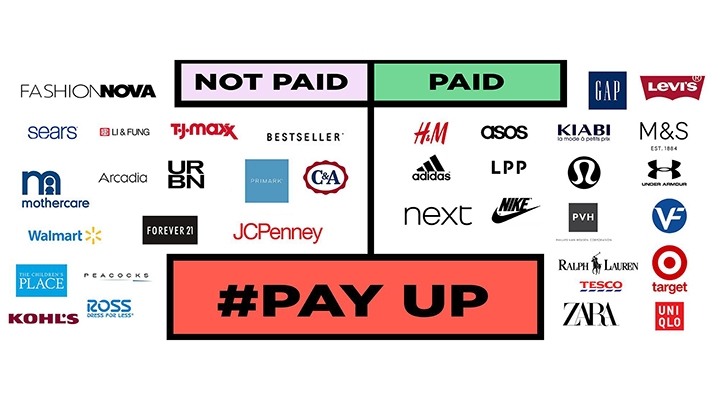
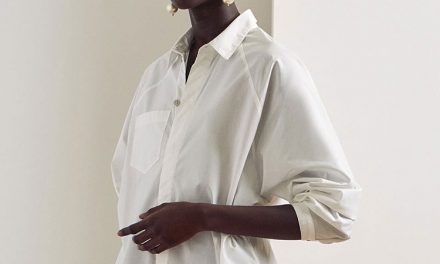

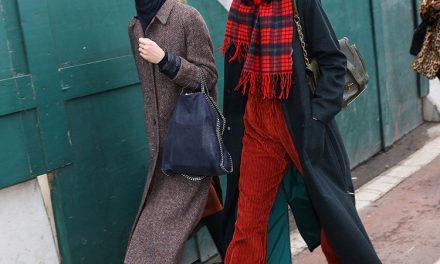

Trackbacks/Pingbacks